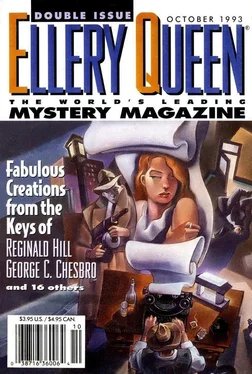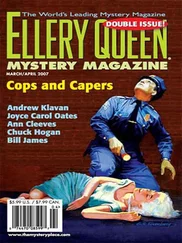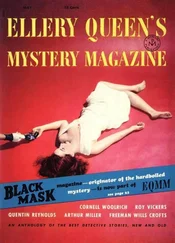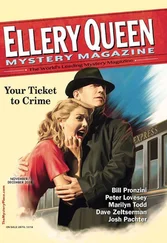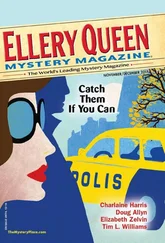Charles Ardai - Ellery Queen’s Mystery Magazine. Vol. 102, No. 4 & 5. Whole No. 618 & 619, October 1993
Здесь есть возможность читать онлайн «Charles Ardai - Ellery Queen’s Mystery Magazine. Vol. 102, No. 4 & 5. Whole No. 618 & 619, October 1993» весь текст электронной книги совершенно бесплатно (целиком полную версию без сокращений). В некоторых случаях можно слушать аудио, скачать через торрент в формате fb2 и присутствует краткое содержание. Город: New York, Год выпуска: 1993, Издательство: Davis Publications, Жанр: Детектив, на английском языке. Описание произведения, (предисловие) а так же отзывы посетителей доступны на портале библиотеки ЛибКат.
- Название:Ellery Queen’s Mystery Magazine. Vol. 102, No. 4 & 5. Whole No. 618 & 619, October 1993
- Автор:
- Издательство:Davis Publications
- Жанр:
- Год:1993
- Город:New York
- ISBN:нет данных
- Рейтинг книги:3 / 5. Голосов: 1
-
Избранное:Добавить в избранное
- Отзывы:
-
Ваша оценка:
- 60
- 1
- 2
- 3
- 4
- 5
Ellery Queen’s Mystery Magazine. Vol. 102, No. 4 & 5. Whole No. 618 & 619, October 1993: краткое содержание, описание и аннотация
Предлагаем к чтению аннотацию, описание, краткое содержание или предисловие (зависит от того, что написал сам автор книги «Ellery Queen’s Mystery Magazine. Vol. 102, No. 4 & 5. Whole No. 618 & 619, October 1993»). Если вы не нашли необходимую информацию о книге — напишите в комментариях, мы постараемся отыскать её.
Ellery Queen’s Mystery Magazine. Vol. 102, No. 4 & 5. Whole No. 618 & 619, October 1993 — читать онлайн бесплатно полную книгу (весь текст) целиком
Ниже представлен текст книги, разбитый по страницам. Система сохранения места последней прочитанной страницы, позволяет с удобством читать онлайн бесплатно книгу «Ellery Queen’s Mystery Magazine. Vol. 102, No. 4 & 5. Whole No. 618 & 619, October 1993», без необходимости каждый раз заново искать на чём Вы остановились. Поставьте закладку, и сможете в любой момент перейти на страницу, на которой закончили чтение.
Интервал:
Закладка:
“Taken ill.”
“I came ahead because I was afraid you’d tell me not to come. And I did so want to see the president.”
“Is that a Louisiana accent I’m listening to?” Linford said. This was all the permission Roy needed. He was in.
“Better than that, sir. Smokey Valley.”
The president got to his feet. It surprised Roy how big he was. Even in his socks, he towered over everybody else. They shook hands. “Royal Flagg, your mother is one fine piano teacher. Why, she almost taught me to play ‘Beautiful Ohio.’ ”
Everybody laughed and Roy relaxed even more. But when Fanny Temple offered him a drink, he refused. It seemed good tactics. He was not a member of this party. He would make his pitch, and he would leave his script in the president’s hands, and he would go.
The others resumed their seats. Roy remained standing. “I don’t want to intrude on your quiet time, Mr. President, in such peaceful surroundings with these good people.”
“Don’t you just love it?” the president said.
“So I’ll say my piece and take my leave. I’ve written a screenplay. I took the liberty of bringing it with me.”
“Listen to this, Ellis. Wake up, he’s making a pitch. Give the man a Kewpie doll.”
“I want your permission to hand it to you, Mr. President. Because it’s all about the town we both grew up in and the people who live there. And it comes from the heart.”
Linford was sitting now, big woolly feet angled on the carpet. He took the script from Roy, balanced it on a knee, and opened the cover.
“All I ask is for you to read it. Then pass it on to whoever you think ought to see it.” Roy glanced at Fanny Temple. She granted him a solemn wink.
There was a movement outside the room, voices rumbling in the vestibule. One of the suited men walked in, glancing at Roy as he said, “Mr. President?”
“What is it, Mel?”
“There’s been some trouble on the freeway south of here. A unit belonging to the highway patrol went over. There’s an officer killed.”
Fanny said, “God help us.”
Mel went on, “The unit that crashed, and others, were in pursuit of a vehicle driven by this man here. The car was reported stolen.”
“Are you sure of that?”
“We spoke to his mother, sir. She’s waiting down the hill in the car. She told us they were coming here.”
After a silence, Linford said, “This is very serious, Roy.”
“I know it is, sir.”
“You’re going to have to go with Mel and answer for whatever you’ve done.”
“I’m ready to do that,” Royal Flagg said. “But can I ask you to read my script all the same?”
The president riffled the pages, ending back at page one. “I have a problem with the title. An Air That Kills. That’s Housman, isn’t it? ‘A Shropshire Lad’?” Linford tipped his head as he began to recite:
“Into my heart an air that kills
From yon far country blows.
What are those blue, remembered hills,
What spires, what farms are those?”
“You know that poem, sir!”
“The line you chose for your title has a negative connotation. Could be talking about pollution, hydrocarbons. You’d be better off calling your play Blue Remembered Hills.” He handed back the script.
“That’s a good idea. I’ll change the title.”
“And maybe you can work on the rest of it while you’re at it. One more draft can’t hurt.”
Mel was staring at Roy. His eyes were hard, his face a mask. “Let’s go,” he said.
Leaving the room with Mel behind him, shoving him, Roy managed to turn and say, “Thank you, sir. You only glanced at my script and you’ve improved it a lot.”
“That’s why they elected me president,” Linford said as agents in the vestibule seized Roy and roughly cuffed his hands behind his back, making his wrists bleed while they hurried him out of the house.
The Haunted Dolls’ House
by M. R. James
The following ghost story by M. R. James was written specially for the library of a dolls’ house built in honor of Britain’s Queen Mary. Visitors to the Wembley Exhibition of 1924 would have seen the structure, which was designed by Sir Edwin Lutyens, filled with pictures and furniture by leading artists and craftsmen of the day, but the house was not then, nor as far as we know, at any future time, peopled with the six-inch dolls for which it was designed. Ultimately, the house found its way to Windsor Castle where it remained at least up to the time of the 1992 fire, when it contained the castle’s only working piece of fire equipment, a tiny fire engine designed by Lutyens. Unlike Queen Mary’s Dolls’ House, the miniature building of M. R. James’s imagination is all too full of inhabitants. A Cambridge don, James was celebrated for his ghost stories, which he often read to friends on Christmas Eve at King’s College...
“I suppose you get stuff of that kind through your hands pretty often?” said Mr. Dillet, as he pointed with his stick to an object which shall be described when the time comes: and when he said it, he lied in his throat, and knew that he lied. Not once in twenty years — perhaps not once in a lifetime — could Mr. Chittenden, skilled as he was in ferreting out the forgotten treasures of half a dozen counties, expect to handle such a specimen. It was collectors’ palaver, and Mr. Chittenden recognized it as such.
“Stuff of that kind, Mr. Dillet! It’s a museum piece, that is.”
“Well, I suppose there are museums that’ll take anything.”
“I’ve seen one, not as good as that, years back,” said Mr. Chittenden thoughtfully, “but that’s not likely to come into the market: and I’m told they ’ave some fine ones of the period over the water. No, I’m only telling you the truth, Mr. Dillet, when I say that if you was to place an unlimited order with me for the very best that could be got — and you know I ’ave facilities for getting to know of such things, and a reputation to maintain — well, all I can say is, I should lead you straight up to that one and say, ‘I can’t do any better for you than that, sir.’ ”
“Hear, hear!” said Mr. Dillet, applauding ironically with the end of his stick on the floor of the shop. “How much are you sticking the innocent American buyer for it, eh?”
“Oh, I shan’t be over hard on the buyer, American or otherwise. You see, it stands this way, Mr. Dillet — if I knew just a bit more about the pedigree—”
“Or just a bit less,” Mr. Dillet put in.
“Ha, ha! You will have your joke, sir. No, but as I was saying, if I knew just a little more than what I do about the piece — though anyone can see for themselves it’s a genuine thing, every last comer of it, and there’s not been one of my men allowed to so much as touch it since it came into the shop — there’d be another figure in the price I’m asking.”
“And what’s that: five and twenty?”
“Multiply that by three and you’ve got it, sir. Seventy-five’s my price.”
“And fifty’s mine,” said Mr. Dillet.
The point of agreement was, of course, somewhere between the two, it does not matter exactly where — I think sixty guineas. But half an hour later the object was being packed, and within an hour Mr. Dillet had called for it in his car and driven away. Mr. Chittenden, holding the cheque in his hand, saw him off from the door with smiles, and returned, still smiling, into the parlour where his wife was making the tea. He stopped at the door.
“It’s gone,” he said.
“Thank God for that!” said Mrs. Chittenden, putting down the teapot. “Mr. Dillet, was it?”
“Yes, it was.”
Читать дальшеИнтервал:
Закладка:
Похожие книги на «Ellery Queen’s Mystery Magazine. Vol. 102, No. 4 & 5. Whole No. 618 & 619, October 1993»
Представляем Вашему вниманию похожие книги на «Ellery Queen’s Mystery Magazine. Vol. 102, No. 4 & 5. Whole No. 618 & 619, October 1993» списком для выбора. Мы отобрали схожую по названию и смыслу литературу в надежде предоставить читателям больше вариантов отыскать новые, интересные, ещё непрочитанные произведения.
Обсуждение, отзывы о книге «Ellery Queen’s Mystery Magazine. Vol. 102, No. 4 & 5. Whole No. 618 & 619, October 1993» и просто собственные мнения читателей. Оставьте ваши комментарии, напишите, что Вы думаете о произведении, его смысле или главных героях. Укажите что конкретно понравилось, а что нет, и почему Вы так считаете.
